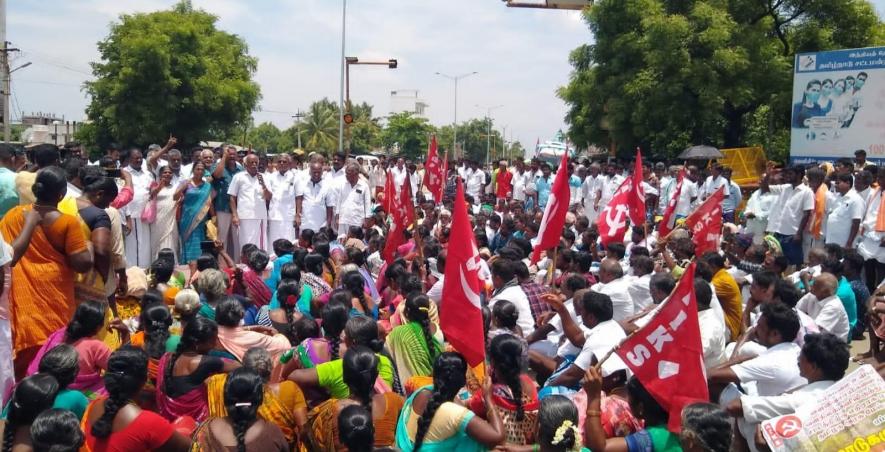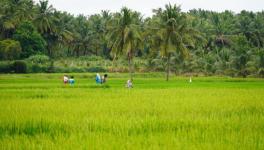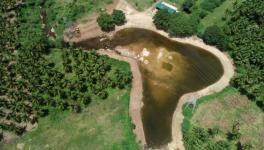TN: Strong Opposition to Court Ban on Cattle-Grazing in Forest Land

Protest against ban on cattle-grazing in Theni. Image courtesy: P Shanmugam
The Madras High Court's sudden ban on cattle-grazing in forest land provoked outrage among forest-dwelling and pastoral communities in Tamil Nadu. In a judgement passed on March 4, 2022, the High Court directed the state government to prohibit cattle-rearers from taking their livestock for grazing inside forest areas.
The forest department was soon to act and impose the ban in various parts of Tamil Nadu. The affected communities have been rearing livestock for generations in the hills, and a ban without considering alternatives hits at their livelihood.
Moreover, the ban on cattle-grazing goes against the 'community rights' granted to Scheduled Tribes and Other Traditional Forest Dwellers in the Forest Rights Act, 2006.
Many organisations outrightly opposed the ban and held demonstrations urging the Court to reconsider its order.
After strong opposition, a modified order was issued on March 17. Under the new order, grazing was banned in tiger reserves, elephant corridors, wildlife sanctuaries and national parks. It also mentioned that the authorities may grant permission in other forest areas subject to the provisions of the Tamil Nadu Forest Act.
HASTE JUDICIARY?
A division bench of Justice V Bharathidasan and Justice N Sathish Kumar passed the blanket ban order in response to a PIL moved by G Thirumurugan of Ramanathapuram. According to the petitioner, people are grazing their cattle in Megamalai grasslands and wildlife sanctuaries in the Theni district in violation of the Tamil Nadu Forest Act provisions.
However, in the judgement of the case, the judges ordered a state-wide ban on herding cattle on forest land.
"It is not clear based on what study the judiciary concluded that cattle-grazing affects forest resources. The ruling violates the traditional right of people to graze their goats, cattle, and horses in hilly areas. We note that this will create problems across the state," said Shanmugam, general secretary of Tamil Nadu Vivasayigal Sangam.
He questioned if the judges gave this a deep thought before issuing the judgement and accused the judges of handing down a verdict based on the misinformation given to them by the forest department.
"The forest is not just for wildlife! Rather the Court has failed to consider that the people dependent on the forest, other animals and the livelihood of the people are very much part of the forest," said Shanmugam.
Moreover, CR Bijoy cited that the Court went against the grazing rights granted to adivasis and other traditionally forest-dwelling communities granted by the Forest Rights Act of 2006 and the Tamil Nadu Forest Act 1882.
Bijoy pointed out that even after the modified verdict, the ruling applies to 6.23% of the state's total land area, approximately 15,000 sq. km.
'GOVT MUST APPEAL IN SC'
All India Kisan Sabha (AIKS) sent a petition to Chief Minister MK Stalin the day after the initial verdict banning cattle-grazing in forest land was passed, urging him to intervene to protect the right to graze.
The letter read, "Livestock are needed to expand organic farming. The livelihood of millions of people depends on livestock rearing. There will also be a sharp decline in milk production due to the ban. Country cattle and Jallikattu buffalo breeding will be completely wiped out. Tens of thousands of pastoral people who rear goats and cows as nomads will be severely affected."
It further read, "If the cattle-grazing in the hills is sent to the plains, they will not get adequate fodder and could lead to their extinction."
The letter reiterated that livestock plays an important role in developing forest resources and environmental protection.
"In Tamil Nadu, in the Western Ghats and Eastern Ghats, a native breed of mountain cattle has grazed the hills for a long time, and its dung improves soil fertility and nourishes various plants in the hills," it read.
The decision to ban grazing in the elephant corridors, tiger reserves and other jungles was also strongly opposed. Tribals have been grazing their cattle in these lands for generations, and many of their main occupations are livestock rearing. Moreover, the government has grazing lands set aside for them. Such land is already encroached upon by the forest department and greatly reduced in size.
The forest department has already implemented a ban on cattle-grazing in various parts of Tamil Nadu and has simultaneously begun the process of collecting bribes to violate the rules. The forest department is particularly involved in such activities with the tribal people in the hills.
AIKS urged the Tamil Nadu government to appeal against the Court verdict in the Supreme Court. It asked the state to take appropriate action to protect the grazing rights granted to the people by the Forest Rights Act and improve livestock rearing in Tamil Nadu.
THENI DISTRICT
In the judgement of the case, the Madurai bench of the Madras High Cssourt ordered the Tamil Nadu state to form a special force team and evict cattle-rearers from the Meghamalai grassland within four months.
Shanmugam said, "The ban will affect the lives of thousands of people living in 96 villages in eight panchayats. The same Court, in another case, ruled against the illegal eviction of people who have been living in Meghamalai for generations."
"The people have been grazing their cattle in the forest land for three generations here in the Theni district. The cattle is certified by veterinary doctors, and permission is taken from the forest department before grazing," he said.
"Theni district country and wild cattle are endangered cattle breeds and need to be protected. A ban on grazing native cattle is tantamount to the complete extermination of this species," he added.
These livestock graze in the plains for six months and in the hills for the next six months in this region.
In the recent Jallikattu competitions held at Avaniapuram, Palamedu and Alankanallur, many bulls from the Theni district performed well and won prizes.
Get the latest reports & analysis with people's perspective on Protests, movements & deep analytical videos, discussions of the current affairs in your Telegram app. Subscribe to NewsClick's Telegram channel & get Real-Time updates on stories, as they get published on our website.
























